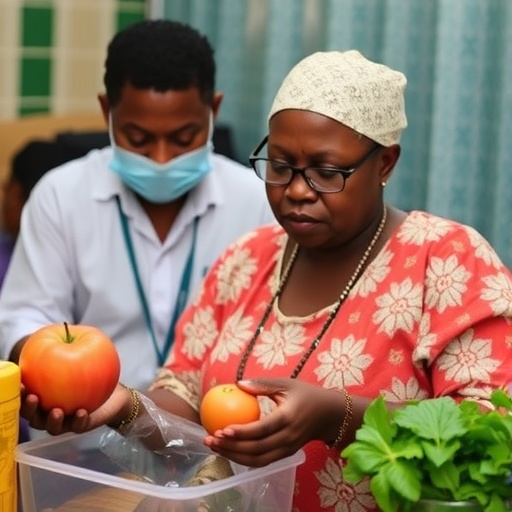In a groundbreaking study that tackles the growing concern of nutrition management within healthcare policies, Iruhiriye, Adeyemi, and Akinmolayan delve into the complexities surrounding the demand and utilization of nutrition data in Nigeria’s health sector. With the growing prevalence of malnutrition in various forms—be it undernutrition, over-nutrition, or micronutrient deficiencies—understanding how institutions can effectively harness and apply nutrition data for informed decision-making becomes critical.
The context in which this research is framed is crucial. Nigeria, a nation characterized by diverse dietary patterns and vast cultural differences, faces significant challenges in managing nutritional health. Despite numerous policies aimed at improving health outcomes, many institutions struggle with the practical utilization of available nutrition data. This disconnect has wide-ranging implications for public health, as inadequate data use can lead to poorly informed policies and ineffective interventions.
The researchers employed a mixed-methods approach to investigate institutional capacities across various health facilities. By combining qualitative interviews and quantitative surveys, the team was able to gather nuanced insights into the current landscape of nutrition data management in Nigeria. This methodology not only allowed for a comprehensive understanding of the institutional frameworks but also highlighted the barriers faced by health professionals in integrating data into policy-making.
One of the central findings of the study revealed that while there is a wealth of nutrition data available, the institutional capacities to demand and effectively use this data are severely lacking. Many health workers expressed a sense of isolation from data sources, often citing difficulties in accessing relevant information due to bureaucratic hurdles or inadequate training in data analysis. This gap underscores the urgent need for capacity-building initiatives aimed at equipping health professionals with the necessary skills to leverage nutrition data effectively.
Moreover, the research identified that the decision-making processes within Nigeria’s health sector are frequently hampered by insufficient collaboration among stakeholders. The fragmented nature of institutional capacity often leads to missed opportunities for data sharing and collaborative policy formulation. Establishing robust partnerships between health sectors, educational institutions, and data analytics organizations could foster an environment where nutrition data is more readily integrated into health policies.
An additional significant aspect of the study was its focus on the role of technology in enhancing nutrition data utilization. The advent of digital tools and platforms offers immense potential to bridge the gap between data availability and its practical application. The research highlighted several innovative practices currently being trialed in various regions of Nigeria, where mobile applications and digital dashboards are used to collect and analyze nutrition-related data in real time. Such technologies could revolutionize how data is monitored and utilized, providing health officials with timely insights necessary for informed decision-making.
Despite these promising developments, the study also raised concerns about the sustainability of these technological solutions. Many institutions lack the ongoing support and resources to maintain effective data management systems over time. Therefore, it becomes imperative for policymakers to not only implement new technologies but also ensure that they are supported by continuous training, funding, and institutional commitment.
The implications of this research extend beyond Nigeria. The challenges faced by Nigerian health institutions regarding data utilization reflect a broader global issue. Many countries grapple with similar barriers, and the lessons drawn from Nigeria’s experience can be informative for other regions facing nutrition management dilemmas. This parallels a growing recognition within the global health community of the need for evidence-based decision-making in tackling nutritional issues.
Another critical consideration highlighted by the research is the importance of community involvement in the utilization of nutrition data. Local communities often possess valuable insights into their nutritional needs and challenges; therefore, including them in the data collection process can provide richer, contextually relevant information. Stakeholder engagement is vital, and the empowerment of local advocates can lead to more effective health programs tailored to the unique challenges within specific communities.
The study’s authors emphasize the need for a paradigm shift in how nutrition data is perceived and utilized within institutional frameworks. It’s essential for policymakers to move beyond the notion of data as merely numbers and statistics, recognizing it instead as a vital resource that informs health strategies. Transitioning to this mindset requires not only structural changes within institutions but also a cultural shift towards endorsing evidence-based practices at all levels of decision-making.
In conclusion, the research conducted by Iruhiriye et al. serves as a crucial catalyst for change within Nigeria’s health sector. By illuminating the challenges and opportunities associated with nutrition data utilization, it provides a roadmap for enhancing institutional capacities. Such advancements are essential for the establishment of effective health policies that can lead to improved nutritional outcomes for Nigeria’s population.
By fostering collaboration among stakeholders, leveraging technology, and actively involving communities in decision-making processes, Nigeria can transform its approach to nutrition management. This research not only addresses immediate challenges in the health sector but also sets a precedent for ongoing dialogue and improvement in global health strategies concerning nutrition.
As nutritional challenges continue to evolve, the insights from this study may offer a beacon of hope for countries navigating similar difficulties, advocating for a renewed commitment to data-driven decision-making that prioritizes the health and well-being of populations.
Subject of Research: Institutional capacity to use nutrition data in Nigeria’s health sector.
Article Title: Assessing institutional capacities to demand and use nutrition data for decision-making in Nigeria’s health sector: A mixed-methods study.
Article References:
Iruhiriye, E., Adeyemi, O., Akinmolayan, Y. et al. Assessing institutional capacities to demand and use nutrition data for decision-making in Nigeria’s health sector: A mixed-methods study.
Health Res Policy Sys 23, 117 (2025). https://doi.org/10.1186/s12961-025-01387-9
Image Credits: AI Generated
DOI: https://doi.org/10.1186/s12961-025-01387-9
Keywords: nutrition data, health sector, Nigeria, decision-making, institutional capacity, mixed-methods research, public health, technology, community involvement, evidence-based policy.
Tags: barriers to effective data usecultural influences on nutritionhealth policy and nutrition dataimproving health outcomes through datainformed decision-making in public healthinstitutional capacities in health sectormalnutrition management in healthcaremicronutrient deficiencies in Nigerianutrition data management challengesnutrition data utilization in Nigeriaqualitative and quantitative research methodsundernutrition and over-nutrition issues





